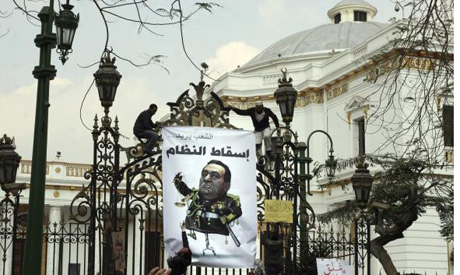
Egyptian protesters hang a cartoon showing Egyptian President Hosni Mubarak, outside the Egyptian Parliament in Cairo, Egypt, Wednesday, Feb. 9, 2011. Around 2,000 protesters waved huge flags outside the parliament, several blocks from Tahrir Square, where they moved a day earlier in the movement's first expansion out of the square. They chanted slogans demanding the dissolving of the legislature, where almost all the seats are held by the ruling party. (AP Photo/ Paul Schemm)
As expected, the Supreme Council of the Egyptian Armed Forces (SCEAF), led by field marshal Mohamed Sayed Tantawi ordered that Egypt's two houses of parliament – the People's Assembly and Shura Council – dissolved to lay the ground for new parliamentary elections.
The military Council's order means that the People's Assembly has become the shortest-living parliament in Egypt's parliamentary history. The Assembly was elected on 28 November and 6 December, 2010, with the ruling National Democratic Party (NDP) gaining the biggest majority in its 33-year-old history.
The NDP secured 85 per cent of the contested seats, not to mention the so-called NDP-independents that brought its majority to 96 per cent. The tactics of Ahmed Ezz, the billionaire business tycoon and the NDP's erstwhile Organizational Secretay, involved manipulating the two-round elections, forcing most opposition forces to withdraw from the race, and giving birth to a new parliament virtually free of any opposition.
Gamal Mubarak, the 47-year-old son of former president Hosni Mubarak, expressed satisfaction at Ezz's tactics, thus forcing young protesters to take to the streets, demonstrating against the regime and asking for the dissolution of the newly-elected assembly. As a result, the short life of the assembly did not exceed 69 days. The shortest assembly since 1957 during the era of late president Gamal Abdel-Nasser. The 1957 National Assembly was dissolved in 1958 when Egypt and Syria decided to merge into one state and create one parliament.
The military Council's order has also brought the Shura Council to an end eight months after its creation in mid-term elections on the first of June. The Shura Council was created by late president Anwar El-Sadat to prepare studies on political, economic and social issues and advise about laws. It comprises 264 seats. When the mid-term elections were held over two rounds in the first two weeks of last June, the NDP got a majority of 91 per cent.
The order also brings the political life of Fathi Sorour, speaker of the People's Assembly and Safwat El-Sherif, chairman of the Shura Council, to a dramatic end.
Sorour is the longest-serving speaker of parliament in Egypt, having filled that position since 1990. El-Sherif, a former minister of information since 1982, has been chairman of the Shura Council since 2004. Sorour and El-Sherif are two NDP old guards, doing their best to keep the status quo at the expense of political reform and change.
Sorour is widely believed to be the mastermind behind 2007's constitutional amendments that paved the way for the inheritance scenario, eliminating full judicial supervision of the elections, and giving Mubarak powers to refer civilians to military tribunals.
El-Sherif graduated from the military academy in 1951, later joining Egypt's intelligence agency and the ruling NDP in 1978. He was appointed chairman of the state information service, the Egyptian Television and Radio Union and a Minister of Information in 1982. He was appointed NDP's secretary for media affairs until 2002 when he was appointed NDP's secretary-general. El-Sherif was very loyal to the regime and to Hosni Mubarak in particular, always calling upon the latter to run for a sixth presidential term next September.
El-Sherif and Sorour have completely disappeared from political life since the dramatic events that took the the country by storm on 25 January. The elimination of Sorour and El-Sherif has been a key and basic issue on the list of demands of the revolution's protestors.
Short link: